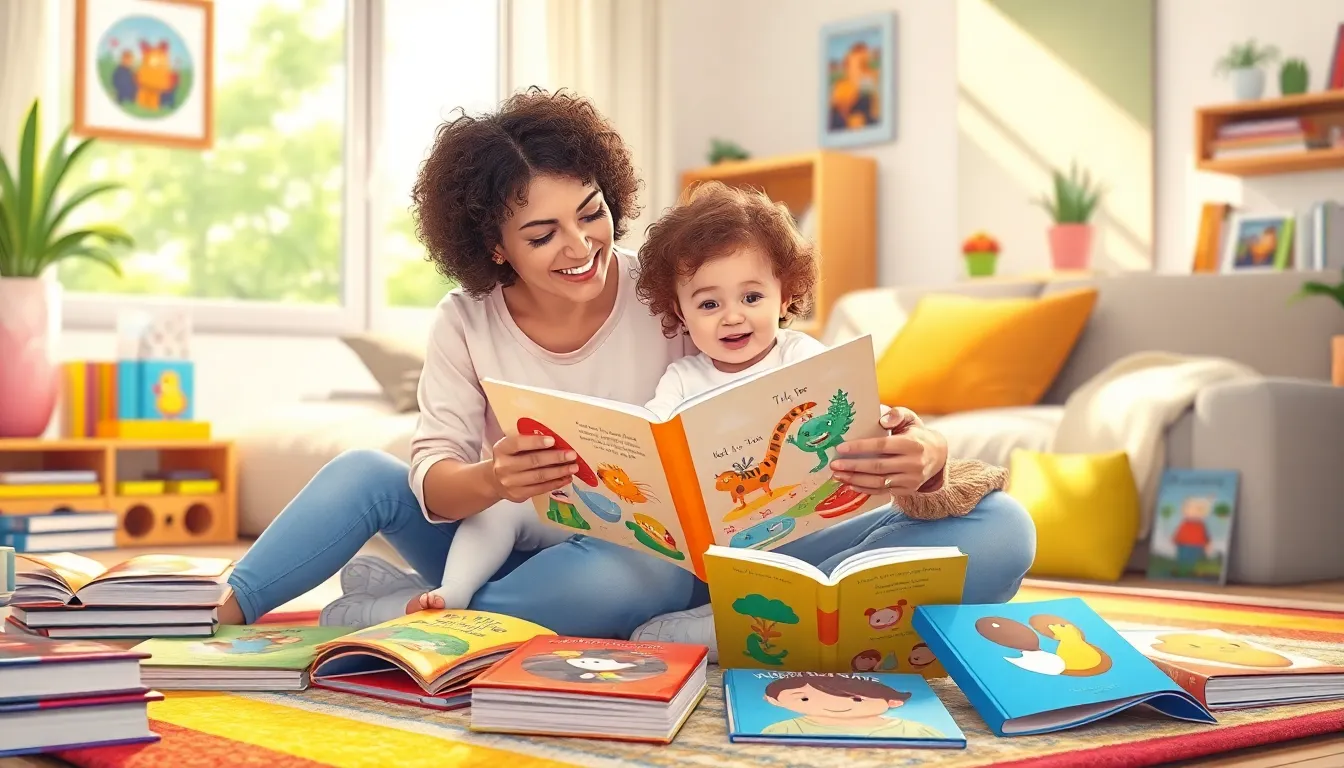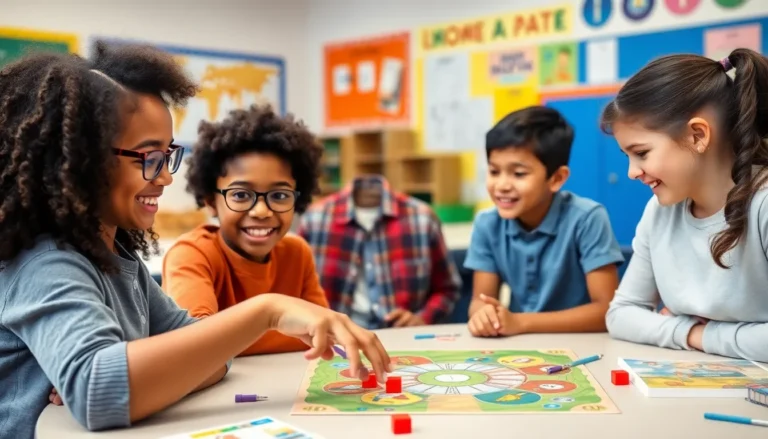Every child’s journey into the world of reading is like a thrilling adventure, filled with exciting twists and turns. From the first time they grasp a book and turn those pages to the moment they devour their favorite novel, each milestone is a cause for celebration. After all, who wouldn’t want to see their little one transform from a curious toddler into a bookworm extraordinaire?
Understanding these reading milestones is crucial for parents and educators alike. It’s not just about memorizing words; it’s about unlocking a universe of imagination and knowledge. So buckle up, because diving into the fascinating world of reading milestones is not just educational—it’s downright fun! Get ready to discover how to support and celebrate each step along the way.
Table of Contents
ToggleUnderstanding Reading Milestones
Reading milestones mark significant moments in a child’s development. These milestones help parents and educators track progress while fostering a love for reading.
Importance of Reading Milestones
Reading milestones serve as critical benchmarks in a child’s literacy journey. Recognizing these achievements enables caregivers to provide appropriate support and encouragement. Progress in reading skills reflects a child’s cognitive and emotional growth. Tracking milestones helps identify areas needing additional attention, ensuring personalized learning paths. Understanding these milestones motivates children, showing them their progress and potential.
Typical Age Ranges for Reading Development
Reading development usually follows a predictable timeline. By age 1, many children start recognizing letters and sounds. Around age 3, they begin to understand basic story structures. At age 5, most children can read simple words and sentences. By age 7, skills typically advance to reading short books independently. Progress may vary; some children may excel earlier, while others require more time, reinforcing the need for individualized approaches to support emerging readers.
Early Childhood Reading Milestones

Understanding early childhood reading milestones helps caregivers support literacy development. These crucial stages contribute to a child’s reading journey.
Birth to 2 Years
At this age, infants and toddlers engage with books through listening and looking. They often enjoy board books with bright pictures and simple text. Children may begin to recognize familiar words and sounds. Enjoying storytime fosters interest in reading. Parents can encourage literacy by commenting on illustrations and expressing enthusiasm about stories. By 18 months, many children point to pictures, signaling recognition and comprehension. Reading aloud daily is instrumental for developing vocabulary and cognitive skills.
2 to 3 Years
By this stage, children show increased curiosity about books and storytelling. Many begin to memorize stories and recite familiar texts. They might ask for favorite stories repeatedly, demonstrating a preference for specific narratives. Listening skills improve significantly, as they can focus longer during storytime. Interactive reading becomes essential, as asking questions about images helps develop comprehension. Children also start to recognize letters and their sounds, setting the foundation for phonemic awareness. Reading together strengthens emotional bonds and motivates a lifelong love of books.
Preschool Reading Milestones
Preschool years mark a critical phase for reading development. During this time, children begin to explore language and books in depth.
3 to 4 Years
At ages 3 to 4, children’s vocabulary expands significantly, often exceeding 1,000 words. They express preferences for specific stories, indicating growing comprehension. Naming letters becomes a common activity, as children show excitement in identifying them. Enjoying picture books fosters imaginative play, enabling them to connect illustrations with narratives. Daily reading sessions encourage engagement, enhancing both vocabulary and storytelling skills. Children may begin recognizing some sight words, typically simple words like “the” and “and.” Recognizing characters and plots from familiar stories supports their understanding of sequence and structure.
4 to 5 Years
Between ages 4 to 5, reading skills develop more rapidly. Children often start to retell stories with detail, showcasing comprehension abilities. Phonemic awareness becomes crucial as they learn to blend sounds and segment words. Mastering the alphabet solidifies their foundation, as they frequently identify letters and their sounds. Reading simple books independently, children enjoy texts that include rich illustrations and repetitive phrases. Family members play a key role in sharing stories, which enhances their desire to read. Activities that involve rhymes and songs boost phonetics and make learning enjoyable. Progressing in these areas equips children for a successful transition to formal education.
Early Elementary Reading Milestones
Early elementary marks a significant phase in reading development. Children enhance their skills dramatically during this period.
5 to 6 Years
At ages 5 to 6, children gain confidence in their reading abilities. Many recognize around 100 sight words, supporting their growing literacy. They start to decode simple texts, showcasing improved phonetic skills. Listening to stories and discussing plot points helps solidify comprehension. Engaging in shared reading experiences encourages critical thinking and fosters a love for literature. Children often enjoy picture books and are curious about chapter books, indicating readiness for more advanced material. Mastering these skills lays a solid foundation for the next phase in their reading journey.
6 to 7 Years
From ages 6 to 7, children typically become more independent readers. They often read short chapter books, introducing them to various genres. Many can summarize stories, demonstrating comprehension and retention of information. Vocabulary expands significantly, with children encountering new and complex words. Parents and educators play a crucial role by providing diverse reading materials and encouraging discussions about content. Group reading activities foster social interaction and highlight the importance of teamwork in learning. Children at this stage should be celebrated for their progress as they develop a deeper understanding of language and storytelling.
Supporting Reading Milestones
Supporting a child’s reading milestones involves collaboration between parents and educators. Consistent strategies can enhance a child’s reading journey and ensure progress.
Effective Strategies for Parents
Parents play a crucial role in fostering reading development. Reading aloud daily cultivates vocabulary and comprehension skills. Introducing a variety of books exposes children to diverse content, sparking interest and imagination. Asking questions about stories encourages critical thinking. Creating a reading-friendly environment, such as setting aside a quiet space filled with books, promotes focused reading time. Recognizing milestones, such as learning new words, builds children’s confidence and motivation. Sharing personal stories also connects reading to life experiences, making texts more relatable. Involvement in their child’s reading journey strengthens the parent-child bond.
Role of Educators
Educators significantly influence children’s reading milestones. Implementing a structured reading curriculum lays the groundwork for literacy skills. Providing diverse reading materials, including fiction and nonfiction, expands students’ horizons. Regular assessments help track individual progress and identify areas needing support. Collaborating with parents fosters a comprehensive approach to reading development. Encouraging group reading activities cultivates social skills and teamwork. Creating engaging lessons with interactive elements enhances students’ interest in reading. Flexibility in teaching methods allows for individualized learning experiences, ensuring every child reaches their potential.
Recognizing and celebrating reading milestones is essential for fostering a child’s love for literature. Each stage in their reading journey not only marks progress but also enhances their cognitive and social skills. By understanding these milestones parents and educators can provide the right support and encouragement.
Creating a nurturing environment that emphasizes daily reading and diverse materials will help children thrive. As they transition from recognizing letters to reading independently the joy of storytelling will enrich their lives. Embracing this journey together ensures that every child develops a strong foundation for lifelong learning and imagination.



